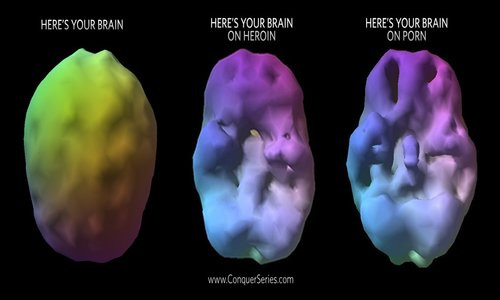Desecration of Relationships: Destroying More Myths About Pornography, Part 2
Here we are again, “back by popular demand” with yet more pornography myths to debunk. There’s so much to unpack when discussing the destructive stain on society that is the porn industry that I’ll never be able to get through it all. However, I can at least uncover the most common misconceptions and outright secular lies about pornography use. Before I do, though, I’d like to begin with a quote from Pope Leo XIII:
“Not only, in strict truth, was marriage instituted for the propagation of the human race, but also that the lives of husbands and wives might be made better and happier.”
Pornography addiction doesn’t make the lives of husbands or wives happier.
Or better.
Or more fulfilled.
Quite the opposite, as we’ve seen—and will see further.
My last post ended with Myth #3, so in an effort to honour math (which is out of character for me, since I don’t do maths), I’ll move on to
Myth #4:
Porn isn’t addictive.
Uh … yes it is! Pornography use is most definitely an addictive substance, something that increases in intensity and duration over time. Once a person is sexually desensitized to a certain level of sexual sin, great and higher levels of stimulation must be sought in order to receive the same high, to achieve the same climax. Otherwise … Things feel stale and a bit hum-drum.
Including intimacy with a real, live, loving spouse.
Desensitization is not only common, but to be expected when engaging in any addictive behaviour—which includes porn use. Addicts need more and more graphic, extreme images in order to be stimulated, just as alcoholics need increased levels of alcohol in order to maintain a buzz.
This is your brain. This is your brain on porn.
Oh dear. That looks like an addicted brain to me.
It would take an entire book to detail all of the scientific research into how pornography changes the chemical balance—causing it to be an imbalance—of users. I won’t go into detail here, because solid articles and books have already been written. Instead, I’ll refer you to a few resources so you can look into this issue on your own:
Gary Wilson, Your Brain on Porn
Luke Gilkerson, Brain Chemicals and Porn: How Porn Affects the Brain
Jon Miltimore, “Harvard Scientist Explains What Porn Does to Your Brain”
Integrity Restored Network, “What is the Science Behind Porn Addiction?” (this is a YouTube video—click here for the entire series)
Fight the New Drug, “How Porn Can Change the Brain”
Myth #5:
Someone who uses pornography does so because he needs more sex and his partner just isn’t giving it to him. It’s all her fault, really.
It’s beyond cruel to blame the victim. Not only is such blame untrue and unjust, it’s also another form of abuse, and a betrayal of all that should be sacred in an intimate relationship.
The idea that a porn addict engages in his destructive behavior due to an unsatisfactory intimate relationship with his partner is an example of backward logic. Pornography use destroys intimacy, it’s not caused by lack of intimacy. An addiction resides within the personhood of the addict, and is never the fault of the betrayed victim.
Using and abusing pornography is never harmless, despite what the addict may want to tell himself. Keeping secrets in a marriage is destructive, and engaging in pornography is a way of covertly (and unconsciously) giving the betrayed partner the message that she isn’t good enough, sexy enough, pretty enough, or exciting enough. In fact, numerous studies have clearly shown that using porn makes a person less empathetic and more critical of his spouse, as well as less satisfied with their relationship.
Authentic love requires authenticity. When one partner uses pornography, there’s no authenticity in the relationship because porn blocks intimacy and makes it more difficult for the user to engage in a mutually self-giving partnership with others.
“Nothing makes us so lonely as our secrets.”
(Paul Tournier, Guilt and Grace)
Myth #6
Porn is harmless, and it’s easy to control how often I use it.
First, pornography isn’t harmless, for all the reasons I’ve already mentioned—plus many more. Second, all addicts claim their addiction is under control and they can “stop at any time.” It’s only the authentically recovering addicts who admit that not only was their porn addiction a slippery slope tempting them toward more sexually abusive and deviant behaviors, but it created a downward spiral of shame within themselves—which in turn created an all-encompassing desire to self-sooth by using more porn.
And so the spiral continued.

He who commits adultery lacks sense; he who does it destroys himself.
(Prov. 6:32)
Most pornography contains graphic violence toward and/or demeaning treatment of women—and women are portrayed as liking it, even begging for more. As I mentioned earlier, this creates, within the brain of a porn user, a desensitization to greater levels of sexual stimulation, which often results in intimate partner violence and an objectification of women. This attitude of objectification inevitably spills forward into their daily lives and interactions not only with their spouse, but with other women they encounter.
Objectification also increases the chances of a sex addict joining online dating sites, sex chat rooms, and engaging in extra-marital affairs.
Chastity means the successful integration of sexuality within the person and thus the inner unity of man in his bodily and spiritual being.
Sexuality becomes personal and truly human when it is integrated into the relationship of one person to another, in the complete and lifelong mutual fit of a man to a woman.
The virtue of chastity therefore involves the integrity of the person and the integrality of the gift. Chastity includes an apprenticeship in self-mastery which is a training in human freedom. The alternative is clear: either man governs his passions and finds peace, or he lets himself be dominated by them and becomes unhappy.
(CCC 2337, 2338)
Myth #7:
My previous porn use doesn’t really bother my partner. I told her I’d stop, so now our relationship is fine.
Really? Are you sure?
Betrayal trauma is a very real—and very damaging—experience to endure.
If a betrayed partner isn’t (yet) showing signs of the immense pain and impact of trauma, the most likely cause is because she’s frozen and numb. Likely you’re familiar fight, flight or freeze, the common responses to a crisis.
When individuals freeze up and are unable to move to defend and protect themselves, their level of trauma increases.
(Dr. Kevin Skinner, Treating Trauma from Betrayal)
When it comes to intimate partner betrayal, very often the initial response is to experience a severe and debilitating loss of safety. Even what should be the comfort of one’s own home has been violated and destroyed. If one’s spouse isn’t a safe haven any longer, what is? Who is?
Answer:
Nothing. No one.
Or so it feel when in the initial, excruciating stages of betrayal trauma.
How does a person recover from that? Anxiety, fear, grieving, anger and numbness … The feelings are so diverse and overwhelming they can’t be expressed outwardly, let alone tolerated inwardly.
And so … Freeze.

Another common—although less discussed—response to trauma is “fawning.” According to C-PTSD expert Pete Walker, “a fawn response is trigged when a person responds to threat by trying to be pleasing or helpful in order to appease and forestall an attacker.” In the case of betrayal trauma, this takes the form of the betrayed spouse trying to be more sexually accommodating, to make sure the house is cleaner and the kids quieter, or any other type of behavior she may cling to in order to try to please her spouse.
This isn’t consent to his actions, nor does it mean she’s not impacted by the crisis she’s surely in. It merely means that she’s processing her extreme trauma in the only way she knows how at that given moment.
If a betraying partner believes his spouse is okay, that all is well and their relationship can go back to normal, he’s deluding himself.
A victim of betrayal trauma has so much to process—more than she even initially knows. Again, that’s a topic for a future article. Suffice to say, she’s not fine.
Both the betrayed spouse and the betrayer have a huge amount of healing work to do—work that will take months, even years to accomplish, and can only be achieved through personal an individual determination, prayer, and the merciful hand of God. Spiritual healing, along with emotional and perhaps even physical recovery, is crucial. This is something that must be faced, admitted, and even embraced in order for the healing journey to begin.
But there’s hope! A great deal of it, in fact.
Jesus’ promise:
“Come to me, all who labor and are heavy laden, and I will give you rest.”
(Matt. 11:28)
Healing Resource for Women Suffering from Betrayal Trauma and Healing After Domestic Abuse:
Hope’s Garden: Healing of Hearts and Families After Betrayal or Abuse






Thank you for that verse!
Thank you, thank you for this article!!! Now I know what killed my marriage and nearly killed me mentally, emotionally and spiritually!!! Near the final end of my marriage, I begged God to save it. I heard loudly and firmly within me the voice of God saying I will not not save your marriage. At the time I felt betrayed and abandoned by God. After all it was the Lord who said plainly in Scripture - Do not divorce. I realize now the Lord, in His great love for me, was actually saving me! What I wouldn't do, leave my husband, God forced on me. Praise and thank you, Dear Lord!!!!